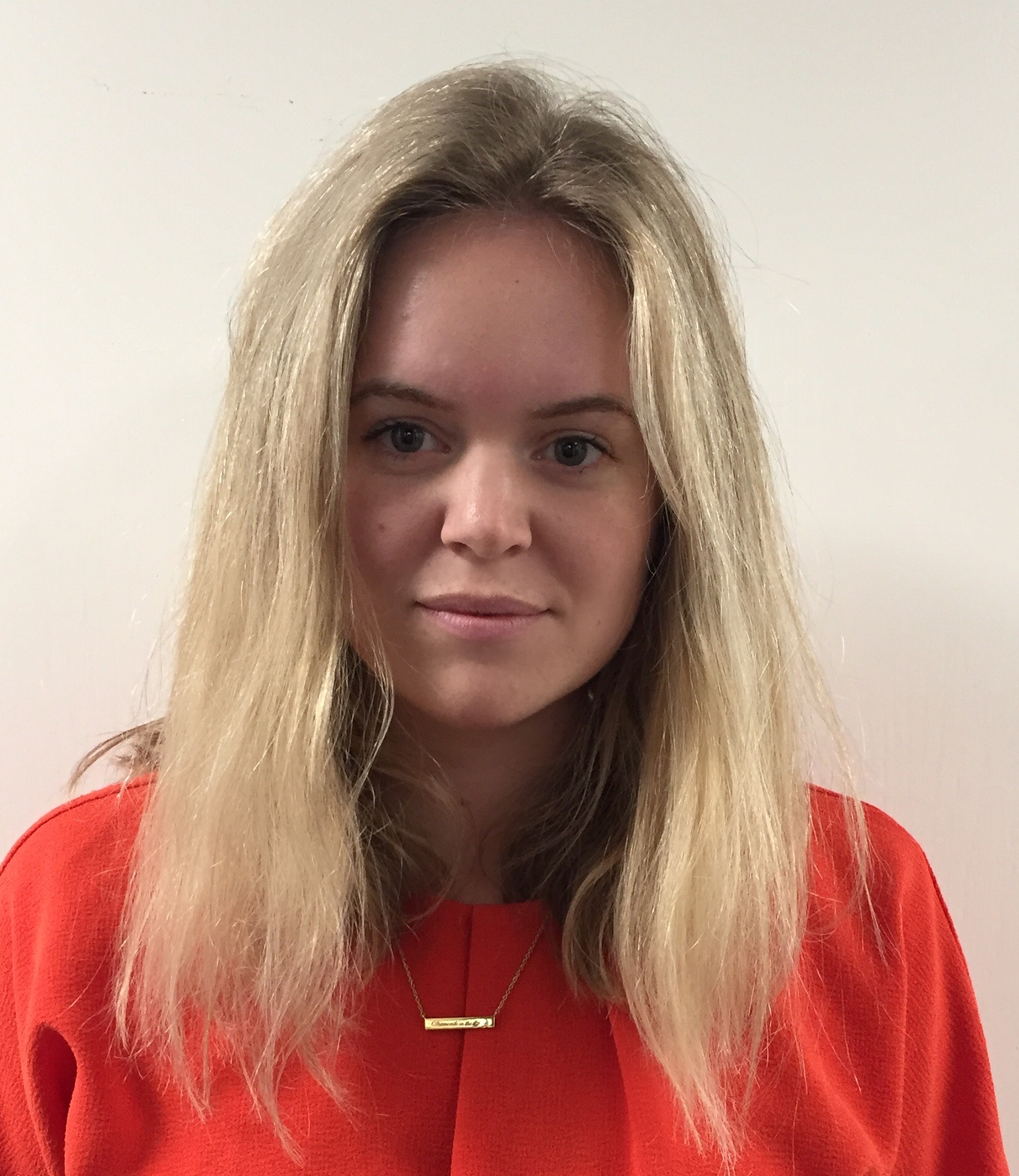Is Paul Manafort's surrender to the FBI the beginning of the end for Trump?
All the key points of the Trump-Russia scandal so far - and why they matter
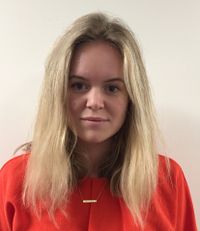
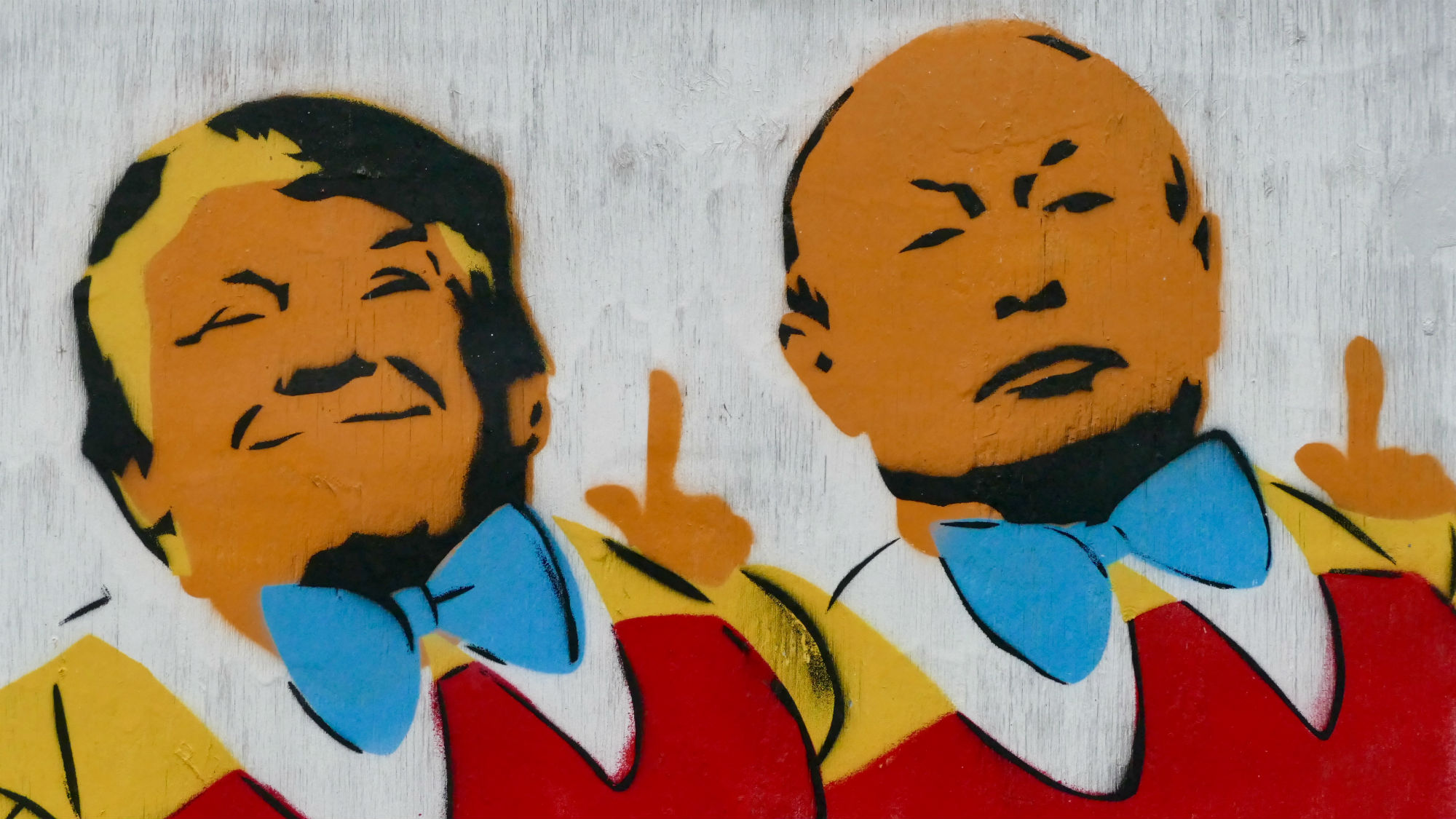
All the key points of the Trump-Russia scandal so far - and why they matter
Did Donald Trump collude with Russia to tilt the result of the U.S election in his favour? It's a question that's been hovering over the U.S President and his team since last summer, when Trump's chances of making it to the White House still looked slim, and the allegations have continued to gather pace since his time in office.
In May this year, lawyer and former FBI Director Robert Mueller was appointed by the US Justice Department to formally investigate alleged foreign electoral intervention by Russia in the presidential elections.
Now CNN and The New York Times report that Trump's former campaign manager Paul Manafort has surrendered himself to the FBI on tax fraud charges which stem from his links to pro-Russian politicians in the Ukraine. The big question now is whether Manafort will share damaging information about his former boss to investigators as part of a plea deal, potentially providing Mueller with a chain of evidence that could lead to the impeachment of the U.S Commander-in-Chief.
What has happened so far in the Russia investigation?
The first big news about Russian interference in the U.S election emerged last summer when the Democratic National Committee (DNC) confirmed it had been targeted by Russian hackers. By December both the CIA and the FBI were in agreement that Russia had attempted to hijack the election to secure a Trump victory, and before he left office, Barack Obama demanded a full investigation.
But did Trump and his team collude with the Russians in this election hack? Putin made no effort to hide his preference for Trump during the race. 'He is a very flamboyant man, very talented,' he said in December 2015, 'no doubt about that. But it’s not our business to judge his merits, it’s up to the voters of the United States. He is an absolute leader of the presidential race, as we see it today. He says that he wants to move to another level of relations, a deeper level of relations with Russia. How can we not welcome that? Of course, we welcome it.'
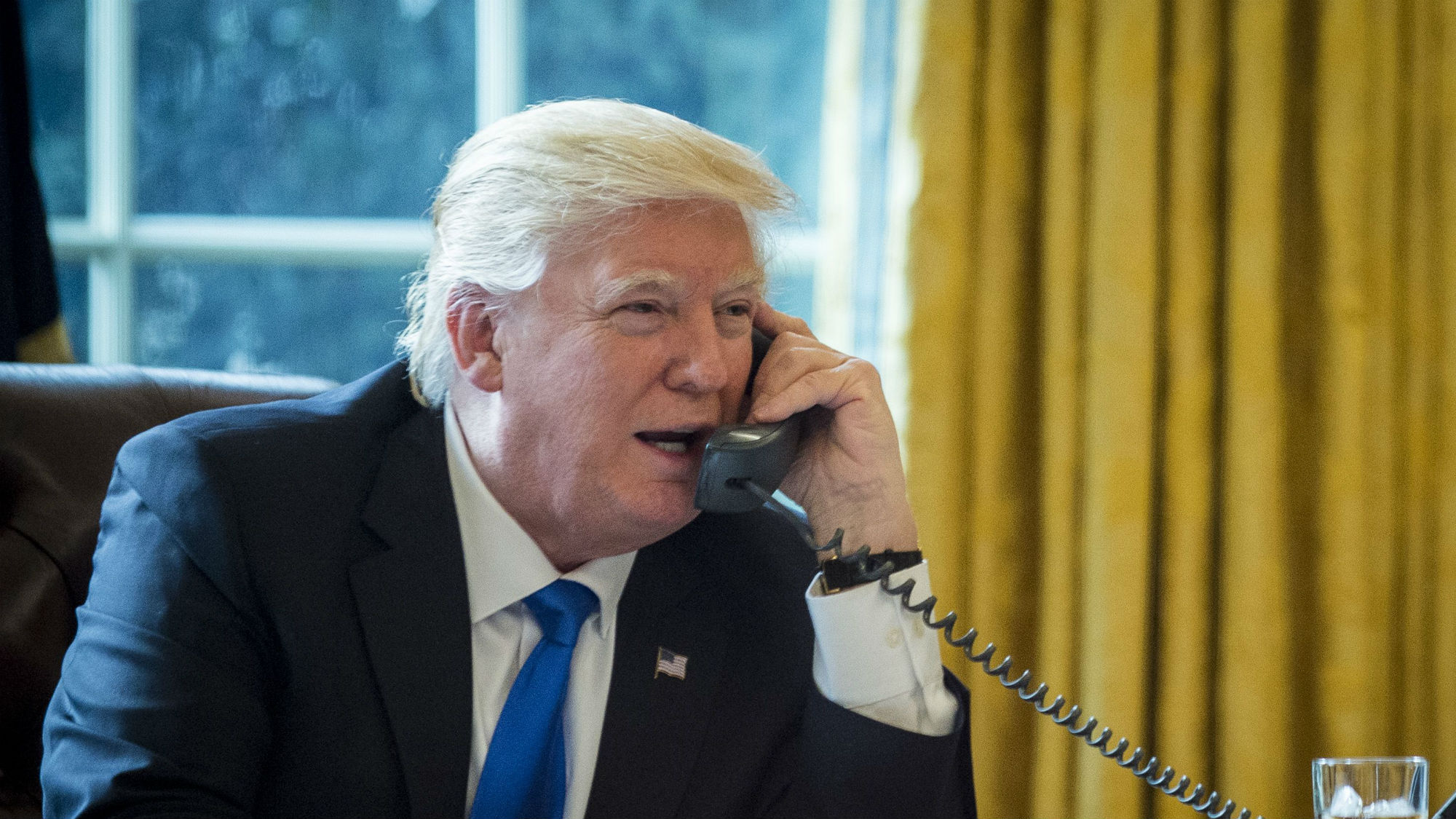
Trump was equally complimentary of the Russian leader, even expressing support for his widely condemned move into Crimea. 'The people of Crimea, from what I've heard, would rather be with Russia than where they were,' he said in an interview with ABC news last year.
Celebrity news, beauty, fashion advice, and fascinating features, delivered straight to your inbox!
At their final campaign debate before the election on 19th October, Hillary Clinton spoke about Russian interference in the election, telling Trump, 'it’s pretty clear you won’t admit that the Russians have engaged in cyberattacks against the United States of America, that you encouraged espionage against our people, that you are willing to spout the Putin line, sign up for his wish list, break up NATO, do whatever he wants to do, and that you continue to get help from him because he has a very clear favourite in this race.'
What are the key Trump-Russia hot points?
All the key players in the Trump-Russia scandal, from his former campaign manager Paul Manafort, to his eldest son Donald Trump Jr.
Paul Manafort and his links to pro-Russia Ukraine
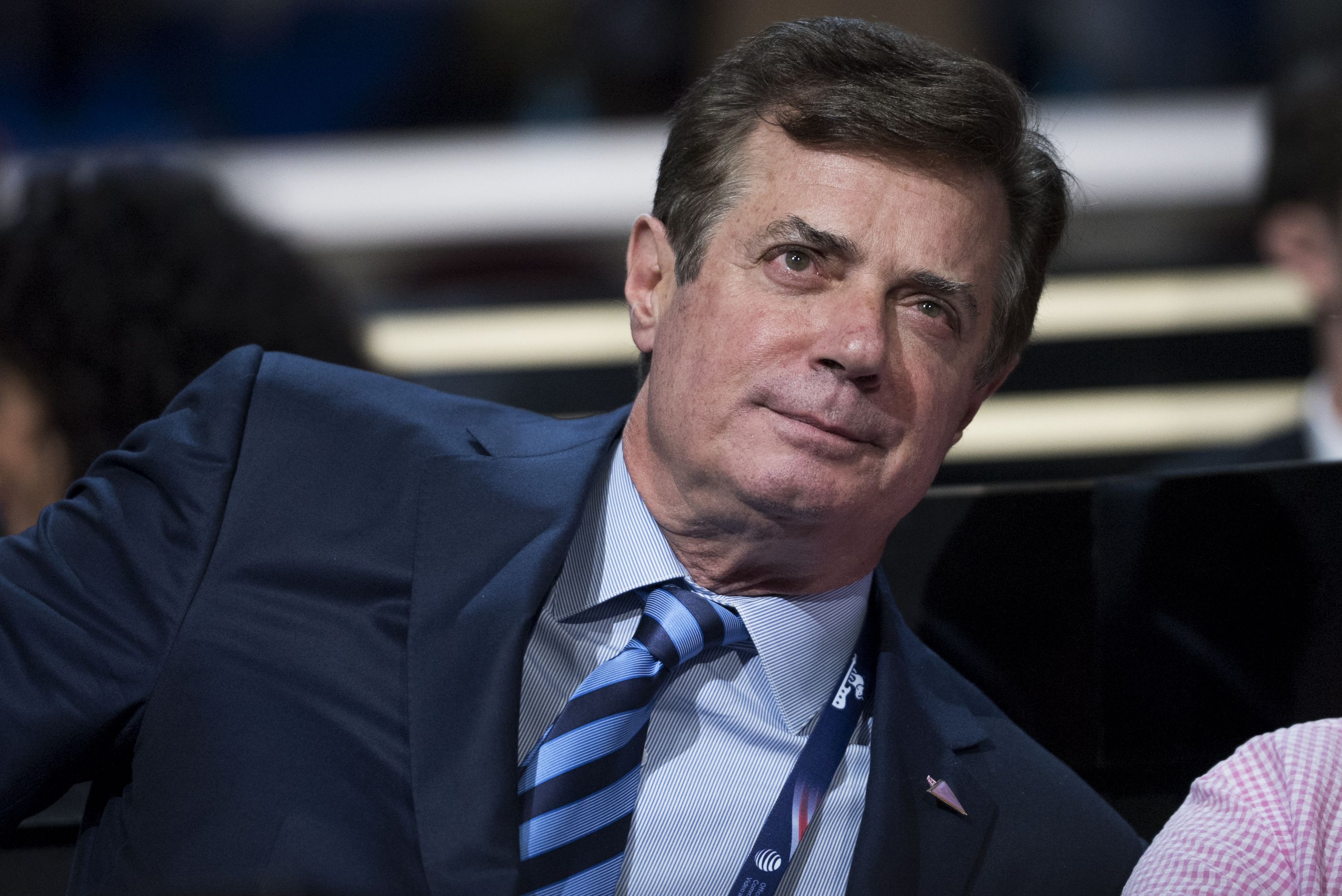
In March last year Trump hired long-term associate and Republican strategist Paul Manafort to help him gather delegates to secure his nomination. Manafort has strong ties with Russia, having previously worked as an advisor to the pro-Russian Ukrainian President Viktor Yanukovych.
In August The New York Times reported the discovery of hand-written ledgers showing Manafort had received $12.7 million in undisclosed cash payments from the Ukranian, pro-Russian Party of Regions. On 19th August Manafort resigned as campaign chairman and was replaced by Steve Bannon. In October this year, he surrendered himself to the FBI on tax fraud charges relating to his links to Yanukovych.
Michael Flynn's private phone calls with the Russian ambassador
General Michael Flynn's career as Donald Trump's national security adviser was short-lived. On 14th February Flynn resigned after intercepted transcripts of a phone call with Russian Ambassador Sergey Kislyak, which took place before Trump's inauguration, revealed they had discussed the sanctions imposed on Russia by Obama as punishment for the election hacks.
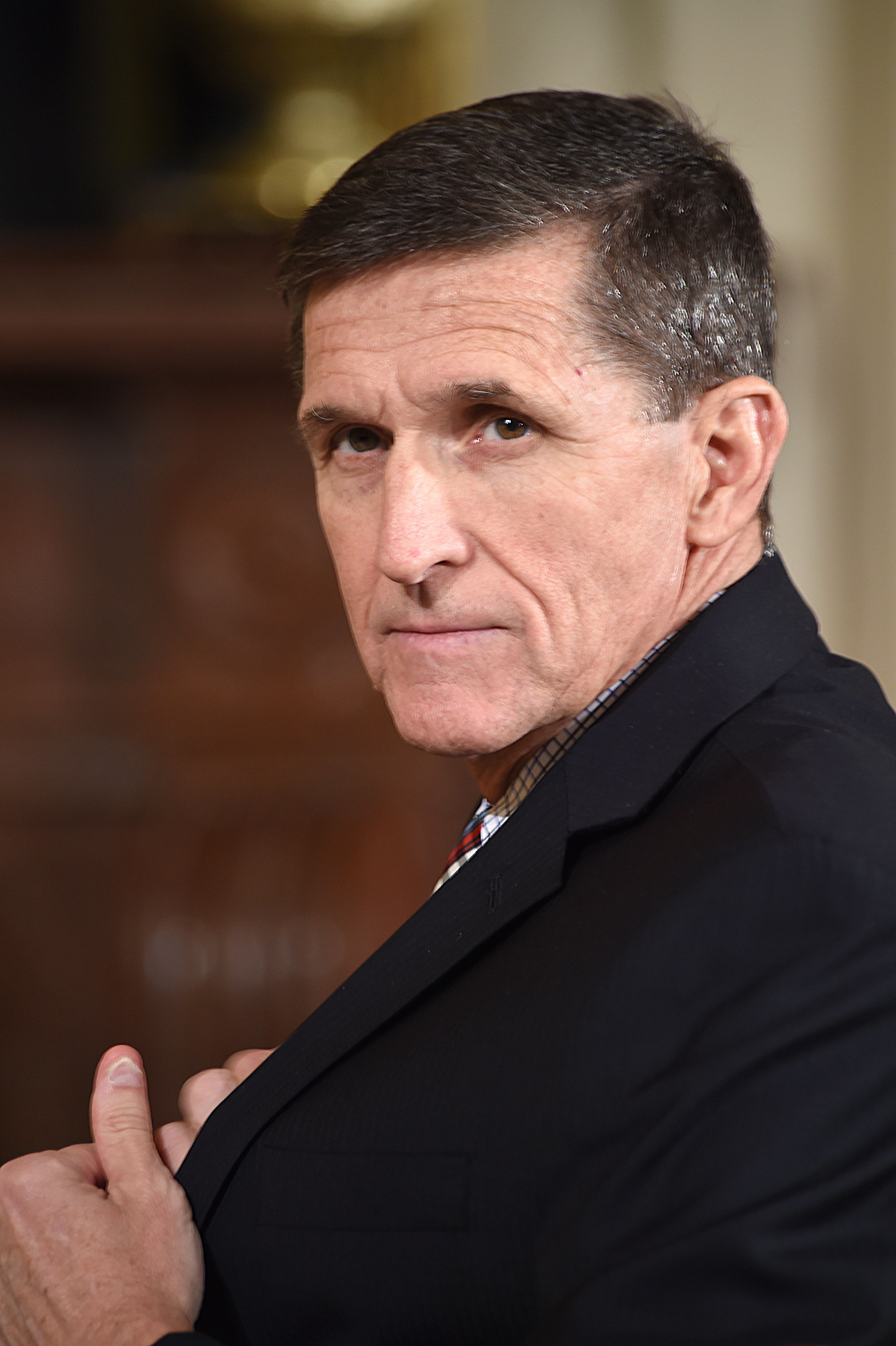
Under the Logan Act civilians are forbidden to negotiate with foreign powers the U.S.A is in dispute with. Flynn appeared to own the blame for this by claiming he gave 'incomplete information' to the Vice President Mike Pence about these phone calls. 'Unfortunately, because of the fast pace of events, I inadvertently briefed the vice-president-elect and others with incomplete information regarding my phone calls with the Russian ambassador', said Flynn in his resignation statement.
According to the Daily Beast, Michael Flynn is next on Mueller's list for indictment.
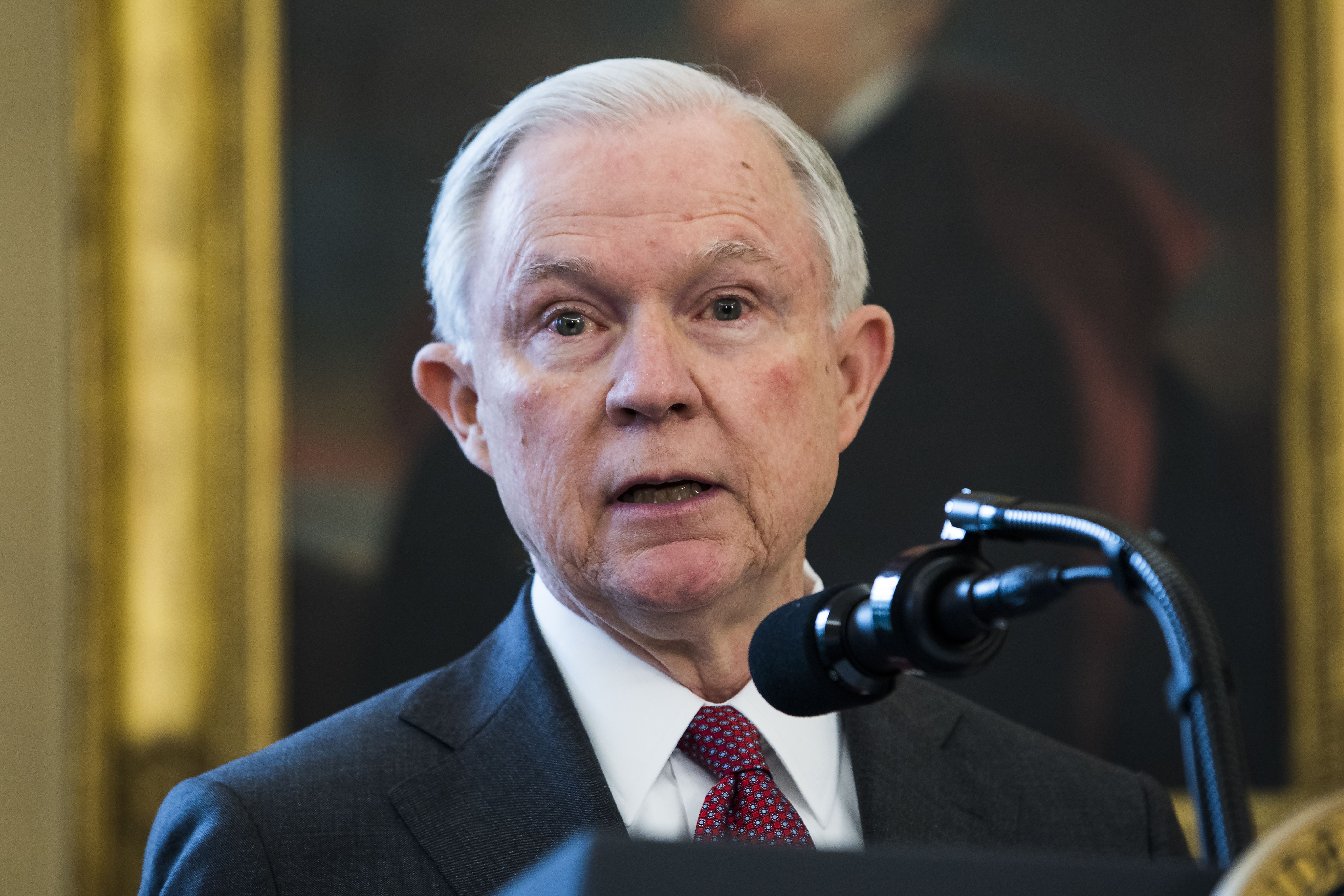
Jeff Sessions' undisclosed meetings with the Russian ambassador
Donald Trump's controversial nominee for attorney general has been accused of 'lying under oath,' after swearing during his confirmation that he 'did not have communications with the Russians' during Donald Trump's presidential campaign. Sessions, an early supporter of Trump's candidacy, was subsequently found to have had two meetings with Russian ambassador Sergey Kislyak in 2016. After the meetings he had not disclosed were revealed, Sessions said 'I did not mention communications I had had with the Russian ambassador over the years, because the question did not ask about them.'
Under considerable pressure, Sessions agreed to recuse himself from investigations into Trump's ties with Russia, though many have argued that his actions constitute perjury and he should resign. Speaking to The Independent, Associate fellow of the US programme and council at Chatham House, Leslie Vinjamuri, questioned why Sessions was so keen to cover up his meetings with the ambassador in the first place. 'The question then is why? Why go that extra step, it wasn’t necessary, and there have been plenty of people who have said he was confused, or that he didn’t think that was a meeting. That all seems like window dressing. But there is a pattern of people wanting to deny contact, and that is what is disturbing.'
Donald Trump Jr, Jared Kushner and Paul Manafort's meeting with Natalia Veselnitskaya
Earlier this year Donald Trump Jr. went on the record insisting that no meetings with Russians had been set up during the election campaign. But earlier this year it emerged that Donald Trump Jr. had not only accepted a meeting in June 2016 with Russian government lawyer Natalia Veselnitskaya, but the primary purpose of the meeting - also attended by Donald Trump's then campaign manager Paul Manafort and his son-in-law Jared Kushner (who has since made a statement denying Russian collusion) - was to secure damaging information about his father's rival Hillary Clinton.
The attempts to secure 'dirt' on Clinton were discovered in a string of emails obtained by The New York Times. When the newspaper threatened to publish the emails, Donald Trump Jr. undercut them by tweeting them out himself - apparently in an effort to control the story.
The emails, which were sent between Rob Goldstone, described by The New York Times as 'a former tabloid reporter and entertainment publicist', and Donald Jr. promised to introduce him to someone 'with some official documents and information that would incriminate Hillary and her dealings with Russia and would be very useful to [Donald Trump].' In his email Goldstone went on to add, 'This is obviously very high level and sensitive information but is part of Russia and its government's support for Mr. Trump.' In his reply, Donald Jr. said, 'If it's what you say I love it, especially later in the summer.'
When The New York Times reported a few days before the email leak that the meeting had happened - Donald Jr. had insisted that the meeting had been 'primarily' about 'a program [involving the] adoption of Russian children.' The subsequent emails appear to contradict this.
Along with tweeting the email thread, Donald Jr. also issued a new statement insisting that, yes, he had met Veselnitskaya on the promise of dirt, but the information about his father's rival had ended up being 'vague' and 'made no sense'; he insisted that she had used the promised information as bait to secure the meeting to talk about the adoption plan instead. Here's the full statement.
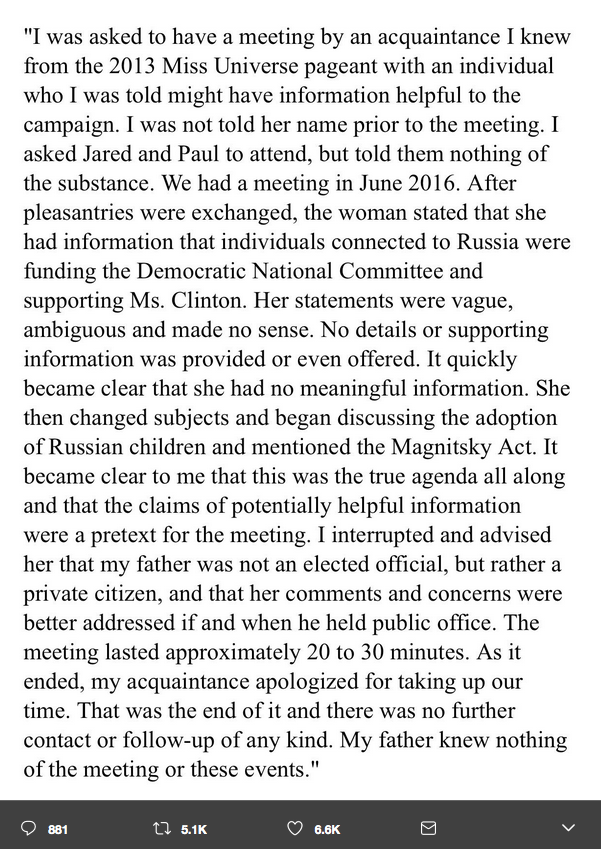
Some legal experts insisted that Donald Jr. had confessed to a federal crime. Others said he had not committed treason under the legal definition. Though Donald Jr. insisted he wasn't guilty because Veselnitskaya had no valuable dirt, one top D.C. defense lawyer told Vanity Fair, 'That might be a good defense under the Federal Election Campaign Act, but then there is the conspiracy statute, which makes it a crime for two or more people to agree to violate a federal law—whether they actually go forward and violate that law is not necessary to prove a conspiracy.'
Whether he is charged with a crime or not, we now know Donald Jr. attended a meeting with a Russian government official and lied about it.
Donald Jr. also insiste that his father knew absolutely nothing about the meeting. But on 7th June 2016, four days after Goldstone's first email asking if they could set up the meeting with Veselnitskaya , Trump Sr. told a crowd at a rally that he would soon be able to reveal damaging information about his opponent Hillary Clinton.
https://youtu.be/SFIZ80Oqxxo
The firing of FBI director James Comey
On 9th May Donald Trump sent a letter dismissing James Comey from his post as Director of the FBI. The FBI had an ongoing investigation underway into possible collusion between Russia and the Trump camp in the election, but following the dismissal Trump said he had let Comey go because of an 'erosion of confidence' in him and his apparent mishandling of the investigation into Hillary Clinton's emails - Comey had controversially reopened the investigation just weeks before the U.S election, a move that was welcomed by Trump at the time as it damaged her campaign. According to Comey, who wrote detailed memos straight after his meetings with the President, in January this year Trump asked Comey to pledge his loyalty to him. Comey, wishing to protect the independence of his office, promised 'honesty' instead. At another meeting in February, Comey wrote that Trump had asked him to drop the investigations into Michael Flynn, who had resigned the previous day.
The question of Carter Page
In March last year Donald Trump told The Washington Post that investment banker Carter Page was one of his foreign policy advisers. This was later denied by Trump's campaign staffers. Page - who worked in Moscow for three years - has frequently come under fire in the past for praising Vladimir Putin's policies. In July last year Page flew to Moscow, where he made a speech criticising America's sanctions against Russia. He is now being investigated by the CIA, FBI and NSA (among others) over alleged contact with Russian officials last year. In February this year he claimed he had not met with Russian officials in 2016, but then later said he would not deny reports that he had met with Russian ambassador Sergey Kislyak at the Republican National Convention.
Trump's mysterious tax returns
A good way to eliminate ambiguity over Trump's potential financial links to Russia would be through Trump's tax returns, which he has repeatedly refused to release. Earlier this year he tweeted that he has 'NOTHING TO DO WITH RUSSIA - NO DEALS, NO LOANS, NO NOTHING', but in 2008 his son Donald Trump Jr said 'we see a lot of money pouring in from Russia' about the Trump empire. Russia may have gained leverage over Trump through business deals, but without examining his tax returns there's no clear way of knowing.
